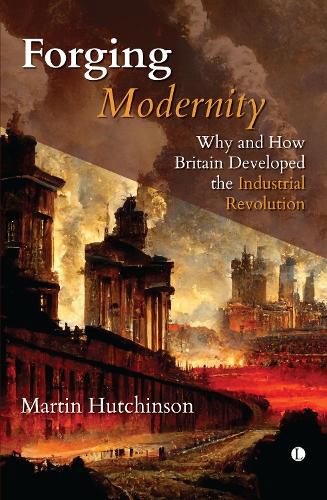Readings Newsletter
Become a Readings Member to make your shopping experience even easier.
Sign in or sign up for free!
You’re not far away from qualifying for FREE standard shipping within Australia
You’ve qualified for FREE standard shipping within Australia
The cart is loading…






The Industrial Revolution provided the greatest increase in living standards the world has ever known while propelling Britain to dominance on the global stage. In Forging Modernity, Martin Hutchinson looks at how and why Britain gained this prize ahead of its European competitors. After comparing their endowments and political structures as far back as 1600, he then traces how Britain, through better policies primarily from the political Tory party, diverged from other European countries. Hutchinson's Harvard MBA allows a unique perspective on the early industrial enterprises - many successes resulted from marketing, control systems and logistics rather than from production technology alone, while on a national scale the scientific method and commercial competition were as important as physical infrastructure. By 1830, through ever-improving policies, Britain had built a staggering industrial lead, half a century ahead of its rivals. Then the Tories lost power and policy changed forever. In his conclusion, Hutchinson shows how changes welcomed by conventional historians caused the decline of Industrial Britain. Nevertheless, the policies that drove growth, ingenuity and rising living standards are still available for those bold enough to adopt them.
$9.00 standard shipping within Australia
FREE standard shipping within Australia for orders over $100.00
Express & International shipping calculated at checkout
The Industrial Revolution provided the greatest increase in living standards the world has ever known while propelling Britain to dominance on the global stage. In Forging Modernity, Martin Hutchinson looks at how and why Britain gained this prize ahead of its European competitors. After comparing their endowments and political structures as far back as 1600, he then traces how Britain, through better policies primarily from the political Tory party, diverged from other European countries. Hutchinson's Harvard MBA allows a unique perspective on the early industrial enterprises - many successes resulted from marketing, control systems and logistics rather than from production technology alone, while on a national scale the scientific method and commercial competition were as important as physical infrastructure. By 1830, through ever-improving policies, Britain had built a staggering industrial lead, half a century ahead of its rivals. Then the Tories lost power and policy changed forever. In his conclusion, Hutchinson shows how changes welcomed by conventional historians caused the decline of Industrial Britain. Nevertheless, the policies that drove growth, ingenuity and rising living standards are still available for those bold enough to adopt them.